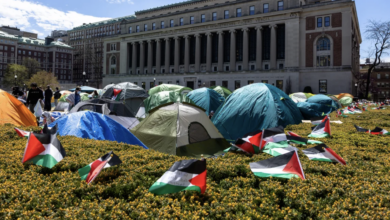International discussions about the Gaza siege have focused on the possibility of easing restrictions at land crossings between Gaza, on one hand, and Egypt and Israel on the other. But there is another alternative: opening Gaza’s sea and air routes to the outside world as well as a passageway between the Strip and the West Bank.
This alternative serves both Egyptian and Palestinian interests, and the Egyptian government would do well to promote it. However, it would have to be adopted as part of a new, wider strategy towards Palestine–one that moves beyond both the armed resistance advocated by Hamas, and the fruitless negotiations-without-resistance pursued by the Ramallah-based Palestinian Authority with the encouragement of Egypt and other Arab states.
Israel wants Gaza to fade into Egypt. Determined to avoid such a scenario, Egyptian authorities are driven by two concerns. First is that opening the Rafah crossing without ending the Israeli siege will ultimately achieve Israel’s goal of displacing the Gaza problem onto Egypt. Here Israeli and Egyptian interests are in conflict. Second is Cairo’s concern that under Hamas rule violence can spill into Sinai and threaten tourism, leaving Egypt vulnerable to US and Israeli accusations of ineffectively fighting terrorism.
Under pressure from the United States and Israel, Egypt had completely closed the Rafah border until Israel’s murderous attack on the Freedom flotilla. Egypt is reportedly continuing the construction of an underground wall along its border with the Strip. This has cost Egypt tremendously in terms of Arab and Muslim public opinion. The confrontation in Cairo last January between Egyptian security forces and international activists en route to Gaza with humanitarian supplies did not win the Egyptian government any new friends.
The Egyptian state therefore finds itself in a political and diplomatic quagmire. It is damned if it opens the Rafah crossing and damned if it shuts it down, which explains why the crossing is presently “ajar”. There is a way out of the quagmire.
Gazans need more than just humanitarian relief and handouts. Their tattered economy must be reconstructed and their fractured social and political life mended. These goals can be achieved by opening Gaza to the world through a seaport and an airport, and integrating the Strip with the West Bank through a safe passageway between the two split territories–an arrangement already agreed to under the 1993 Oslo accords. This will bring Gaza closer to freedom from Israeli occupation.
Linking Gaza to the rest of the world through independent ports relieves Egypt of the threat of taking full responsibility for Gaza. But Egypt and Israel both object to these links on grounds that they would become arms conduits for the Hamas government. Which brings us to the second part of the new strategy.
The Egyptian government can support non-violent, international pressure against Israel to change its policies towards Palestinians. This would help create an alternative to feckless armed resistance, on the one hand, and hollow negotiations, on the other.
On their own, the Palestinians can only annoy Israel militarily, which was their principal aim during periods of “armed struggle.” Although it was seldom their chief form of resistance, armed struggle was inflated by the media and by Israel, who manipulated it to inflict immense destruction and hardship upon the Palestinians. Shelving the option of armed resistance may prove to have its benefits. Once Israel can no longer use Hamas rockets or suicide bombings to paint itself as the victim, its aggression against the Palestinians will be fully exposed.
Peace talks have also failed to deliver results. President Mahmoud Abbas likes to call rocket fire from Gaza nihilistic even though the negotiations he has conducted with Israel have proven no better.
They give the Palestinians a process without substance. They allow Israel to swallow up more Palestinian land under the cover of negotiations. They mask the failure of Arab regimes to meaningfully support the Palestinian cause, and their inability to stand up to Israel even when it slaps them in the face, for example, by ignoring their collectively proposed Arab Peace Initiative.
Little will change if Palestinian statehood is declared, which seems to be the endpoint to which desperation and futile diplomacy will lead. What is needed is an end to the Israeli occupation, not another toothless declaration.
This requires a new strategy of non-violent resistance, coupled with a worldwide boycott of the apartheid state of Israel. This approach is gaining popularity internationally, especially after Israel’s invasion of Gaza, the subsequent Goldstone report, and the recent attack on the international aid flotilla. The growing boycott, divestment and sanctions campaign–known by its acronym BDS–has begun to bite.
This international campaign, led by Palestinian civil society organizations, must be expanded and eventually brought before the UN General Assembly, where Israel cannot be shielded by a US veto. Such steps require Arab engagement and Egyptian leadership.
A new integrated Palestine strategy along these lines will allow Egypt to do the following:
–Stave off Gaza’s merger into Egypt.
–Secure the tourism industry in Sinai and the Red Sea.
–Weaken Israel and deny it an opportunity to justify military confrontation with Egypt or to extract concessions from it in other areas.
–Bring ruling Egyptian elites closer to Egyptian popular sentiments as manifested by professional syndicates and the organized opposition who all reject normalizing relations with Israel.
–Safeguard relations with the US government, which itself has recently experienced an increasingly strained relationship with Tel Aviv.
–Allow Egypt to regain some of its lost leadership and prestige in the Arab world, which is currently being taken up by other regional actors, especially Turkey.
Egypt has been pursuing a tired and counterproductive Palestine policy. It has much to gain and little to lose by shifting to a new strategy, which just might help the Palestinians free themselves from the yoke of Israeli apartheid.
Sharif S. Elmusa is an associate professor of political science at the American University in Cairo.




